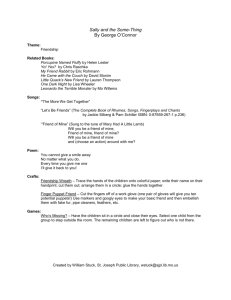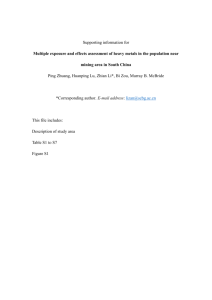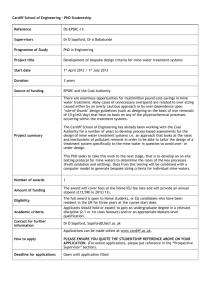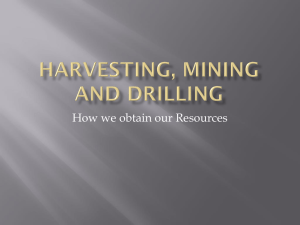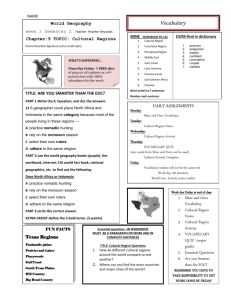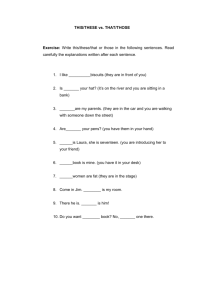Contest Problem - the Mining Quiz List
advertisement
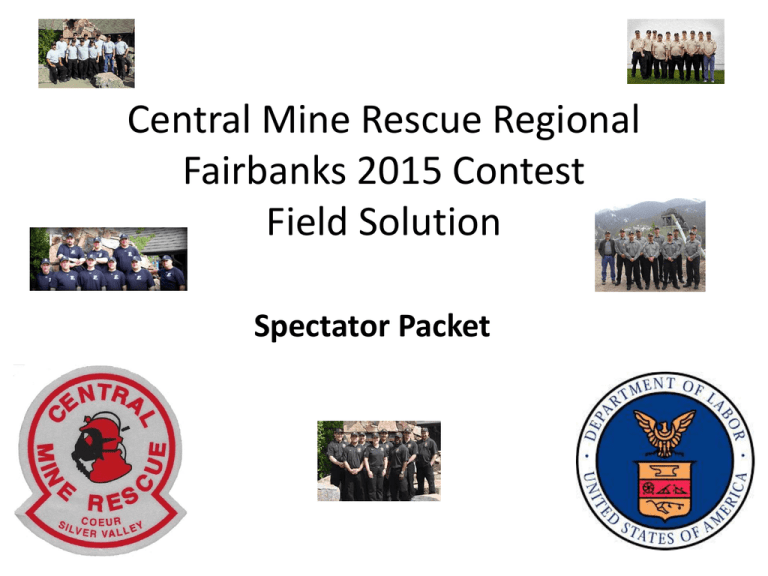
Central Mine Rescue Regional Fairbanks 2015 Contest Field Solution Spectator Packet Welcome to the 2015 Central Mine Rescue Regional Contest Mine rescue contests like this one are held to test the skill of mine rescue teams under controlled conditions. We all hope that a team will never have to use these skills in real life. While working this problem the teams will encounter water over knee deep, bad roof, intense heat (fire), damaged ventilation controls, two missing miners (one they will need to put under oxygen on the field), and an irrespirable atmosphere. Each team will have 60 minutes to complete all of the tasks. Each team will work the problem differently & there is always more than one way to skin a cat. The information that follows is just one way that a team may solve the problem. The men and women involved in mine rescue are special folks. They often give up time with their families & friends to practice, and are willing to lay their lives on the line for others. The families sacrifice too, making them just as special. To both the team members and their families, thank you for what you do. Thank you for being here in support of the teams. Mine Information • • • • • • • • Wee Willie Mine – MSHA ID 50-00001 Tuffett Mining Company Multi-level silver & copper Gas category VI Total employment 16, 8 miners, 2 mechanics, 1 electrician, 2 nippers Two shifts per day, 7 days per week, 10 hours per shift Explosives stored on the surface Ventilation is upcast, main fan is located on the 1035 level in the ventilation raise. Power to the fan is off, locked out & guarded. • No nearby oil or gas wells. • Authorities have been notified. The mine is under a 103(j) order • Back up teams are on site & ready to go. Team Briefing Statement You have arrived underground at the fresh air base of the Wee Willie Mine, near Somewhere Inn, Alaska. I’m Ted, the mine manager. The crew went underground at 6 a.m. this morning to begin their day. At around 9 a.m. I heard a call on the radio from Mike (the nipper) that he was driving the haul truck back to the heading from the dump and was getting close to the airdoors. While we were talking I heard him yell “brakes are gone” and the radio went dead. Ten minutes later the mechanic and one of my miners came up to the surface and told me they smelled smoke and ran to the cage to come out. They didn’t know where George, my other miner or Mike are. We’ve tried calling them on the radio, but neither will answer. A short while ago we started seeing a bunch of black smoke (smelled like tire smoke) coming out of the ventilation shaft. The electrician saw it, panicked and turned the power to the main fan off. HURRY & please find my men! Gas readings from the exhaust raise on the surface show O2 at 10%, CO at 1900 ppm, NO2 at 0 ppm and CH4 at 0% You will have 60 minutes to explore the mine, bring missing miners to the surface, seal or extinguish any fires and assess damage to the mine. Good Luck! Additional information (once the clock has started) • • • The Command Center has assessed the information on the ventilation system provided by the company after the fresh air base was set up. There is an old secondary escape raise that runs from the 1035 level haulage to the 825 level. The company has not been able to find anything on whether or not the raise has been sealed. We’ve provided a simple longitudinal section drawing of how ventilation works in this mine below. 825 Level 1035 Level • • • • • The teams will report to the Fresh Air Base (FAB), which is set up (fictitiously) on the 825 level. The only work the team can perform before starting the clock is stretch out the communication line. The Mine Manager will introduce the #1 and #2 judge to the team(s). Once the clock has been started, the team captain will mark the board with the required information. The judges will provide the captain with the Additional Information handout, maps and mine information. The gas person should be shown to the gas box for the field gas test. They can do the test barefaced (the teams will be so instructed during the Captain’s Meeting). Once the team goes under oxygen, the captain & gas person will go to each shaft and test for gas. Typically they will run each cage up and down the shaft to check function and send a combustible to check for fire and water. (neither are present) 1 2 FAB • • • • Once the condition of the shafts have been assessed the teams will take the cage down using either shaft. The amount of time the team spends underground will depend on which shaft they take. Teams will typically do their 50 foot team check as soon as they step off of the cage. If they do not, they can only go as far as shown (red lines) below. If the team travels down 1 shaft, they may stop in the intersection and the captain & gas person will stretch out into the dump area to the left. Judges will need to keep a close eye on people that enter into the area. There is a possibility for endangerment. If the team choses to use 2 shaft first, they will encounter an area with bad back (must be supported) beginning at the blue line. Most teams will opt to come back out and go down 1 shaft (there won’t be enough posts to support the bad back until they do. 1 2 FAB Advancing past the dump from 1 shaft: • As teams advance past the first right angle they will encounter a placard indicating a gas concentration and the presence of smoke. The team will need to count off going into smoke. When they reach the first intersection (main haulage) they team will need to take a gas test. • The team will proceed into the main haulage. There will be a bad rib to their right. The captain must warn the team of the condition. To the left the team will find additional posts and a placard indicating a lunchbox. The team will find additional information on the back side. As they move inby the team will find airdoors that are damaged on both sides of the drift. A bit further in they will find a placard that says intense heat. The team cannot pass any further. They must retreat out and erect a temporary regulated seal. R Since the team has found one side of the fire, they must deal with the other. The team will come out of the mine and go down 2 shaft. • • Prior to going down the 2 shaft, the team will have to pick up the stopping material and posts that they will need to support the back and build the seal. A team cannot carry more than 5 posts or 2 stopping materials at one time. Since the area with the bad back is 20 feet long and 10 feet wide, the team must set a single row of posts. They must begin no further than 1 foot from the outside border, setting additional posts inby every 5 feet in the direction of travel. Once the posts are set, they can advance in toward the center of the drift. The team will encounter placards showing intense heat and the front of a haul truck on fire. They may try to extinguish the fire, but it will have no effect. The team will have to retreat out and build a regulated seal just outside of the area with bad roof. Once the seals are in place, the team can continue exploring the mine. R R There is a bit of a twist in controlling the fire during this problem involving a raise connecting this level with the one above. The fire isn’t truly controlled until a regulator is in place from above. It doesn’t become an issue yet. Once both sides of the fire are controlled on this level the teams can continue to explore the mine. If the team is in the 2 shaft side, the team will have to support the ground in the direction of travel. • Since the span at the intersection is going to be more than 10 feet, they will have to stand two posts. • Before the team can advance further inby on this side they will have to pump the water. Judges watch for endangerment. • They can start the pump by flipping the switch they passed on the way in. The water should disappear immediately (even in the sump). This does not constitute a ventilation change. Don’t forget to flip the placards. • Along the left side of the drift the team will find a drill. On the opposite side they find a development drill station. If the team is on the 1 shaft side when they get the fire under control (regulated) they can continue to explore the mine on this side. • Once they leave the intersection and start traveling inby they will come across an unconscious miner. The team will have to assess the miner. For expedience, flip the placard after the primary assessment is completed. • Since the air is bad, the team will have to put the miner under air. The team must follow the procedure for donning an apparatus as shown in the rule book. The hoses should stay attached. • Once under air, the miner will have to be taken out of the mine and turned over to EMS. Donning the apparatus is one of the rule changes for 2016. In Nevada it took an average of 15 minutes to fully assess the patient and put him under air. Since we’re trying to get everyone through the field in 8 hours, we’re going to make it unnecessary to put the patient on a backboard with C collar. The rest of the exploration is fairly straight forward. There is only one other place where teams will have to support. The area is 15 feet long, so timbers will have to be set outside <1 foot from the edge and a maximum of no more than 5 feet apart along the direction of travel. • There is a barricade erected at a stope entry. Since the gas levels are irrespirable the teams will have to ventilate the mine before entering. • The placard at the barricade will be two sided. Once the captain knocks on the barricade turn the placard over to show him/her the back. • Once the team has explored the mine (with the exception of behind the barricade), they can call in for a ventilation change to clear the air. B Ventilating the Mine 1. Call the Fresh Air Base and request a ventilation change: a. Close the regulators on either1 or both sides of the fire b. Turn on the fan i. The smoke will clear immediately if above is completed. 1 If a team doesn’t have the raise sealed from above, they MUST seal both sides on this level. If they leave one regulator open and do not seal above, the fire will intensify and burn out the seal with the open regulator. Close Once the ventilation change is made the teams can complete exploration of the mine. The script provided for the answer given by the person behind the barricade will tell the teams that the person is inside of an enclosed area. This means the teams will be able to go into the area without air-locking in. • The team will explore the stope and bring the miner out. • Once the team brings the miner out they have completed all of the tasks they’ve been asked to perform and the captain can stop the clock. • The judges will have a very short conference and begin the 5 minute debriefing with the team. • Once the 5 minute debriefing is complete, the judges will direct the team to the 20 minute look area.
